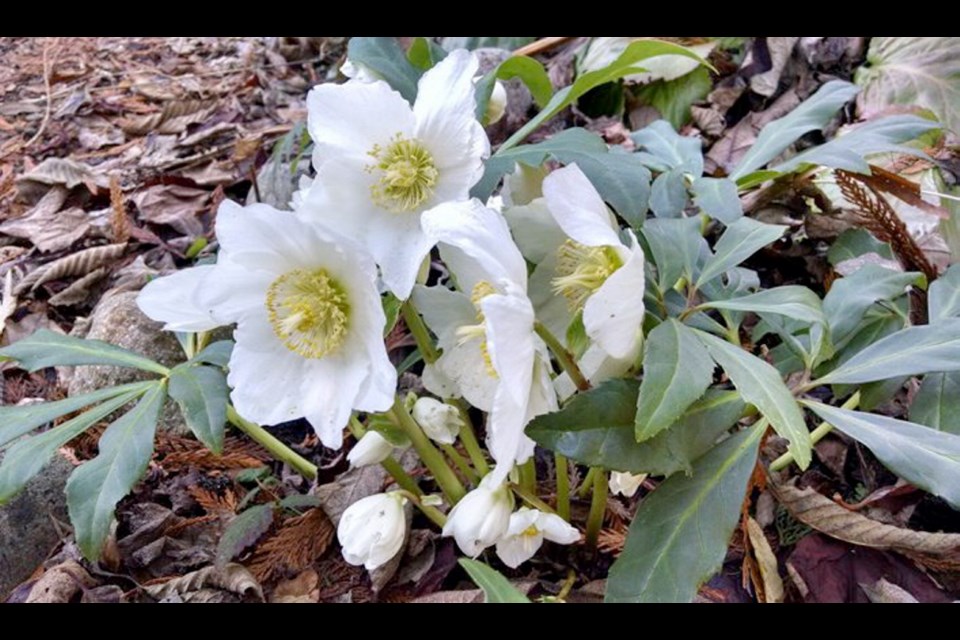A week with my son at Christmas has re-activated a desire to host more visitors to the garden — not because it’s in any way a “show” garden, but that its broad variety of plants makes it a promising teaching garden.
It was an afternoon we spent together in the garden that provoked that desire. As it is with all visitors, I found it immensely interesting to observe what captured his interest as, at one point, we strolled through the garden together with our cameras. He was drawn to capture, close-up, the bubbled texture of a kale leaf, the burnished winter colouring of Oregon grape, a native woodlander, and the intricate pattern of a tree trunk as well as broad, panoramic views of the vegetable garden using a tool on his phone's camera.
We both stopped to admire a showy clump of a Joseph Lemper hellebore in full bloom. In the front garden he took photos of a lemon cypress with pansies in a tall clay urn, a rhododendron underplanted with epimedium, and a tall ‘Winter Sun’ Mahonia that, each December, produces ever more glamorous sprays of yellow flowers.
A puzzle. Christopher was inexplicably enchanted by the small, tightly compact evergreen daphnes in the garden. There are two broad, low-growing Daphne retusa shrubs that I grew from seed years ago, a taller but equally close-knit D. tangutica and several small, seed-grown rock daphnes (D. cneorum).
I heard him talking with friends on the phone about the plants as he described how gazing at them made him feel completely calm and peaceful.
I was intrigued by his reaction, and puzzled too, because extensive research into possible folkloric and flower meanings associated with daphne unearthed no link to mental calm.
All these evergreen shrubs have small, very deep green leaves and a pleasingly neat habit. I’m wondering whether people who have experienced fractured and chaotic times in their lives are soothed by the quiet colour and gentle tidiness of such plants.
However the process works, my next gift to my son will be a pair of small rock daphnes in containers. Therapy on his balcony.
The food. At the close of our afternoon in the garden Christopher and I gathered kale to make the kale and quinoa quiche-style muffins that I wrote about recently. Together, we assembled them quickly. He loved the nutritious, savoury snacks, as I do. They’ve been quite a hit too with readers who have tried them.
I wanted my son to consider the muffins as an item to include on the menu of a small coffee bar he hopes to open soon at the front end of a commercial kitchen used by a group of Vancouver food cart operators.
Christopher delighted also in a raw beet and apple salad I had on hand. That’s another possibility for his little café. The salad is my version of a recipe in a European compendium of organic food. It’s become a pot luck favourite in my home.
To make the salad, mix three medium beets, grated, with one minced onion, one chopped apple, and (optional) chopped, toasted hazelnuts. Toss in a dressing made with three tablespoons apple cider vinegar, four tablespoons sunflower or olive oil, one tablespoon honey, one teaspoon cumin, salt and pepper.
GARDEN EVENTS
Peninsula meeting. The Peninsula Garden Club will meet on Monday at 7 p.m. in the Mary Winspear Centre in Sidney. Gary Brust, a club member since 1985, will present Proven Methods to Achieve the Best Vegetables. Gary grows magnificent tomatoes and mammoth organic onions in raised beds. All are welcome. Non-member drop-in admission fee is $5. peninsulagardenclub.ca.
Flower arrangers. The Victoria Flower Arrangers Guild meets Tuesday from 7-9:30 p.m. in the Garth Homer Centre, 813 Darwin Ave. Janet van Klaveren will unveil proven and effective ways to combine and organize colour within a design to add clarity, balance and emotional response. Visitors are welcome, at no cost. victoriaflowerarrangers.ca.
Elizabeth England lecture. The Victoria Horticultural Society Hardy Plant Group is presenting the annual Elizabeth England Lecture on Sunday, Feb. 22, at 2:30 p.m. in the Salvation Army Citadel, 4030 Douglas St. Dan Hinkley, well known creator of Heronswood Nursery, plant collector, author and lecturer, will elaborate on Plant Marriages: Exceptional Combinations of Foliage and Flower. Tickets at $20 are available at all Victoria Dig This stores, Dinter Nursery in Duncan, and at the door.



